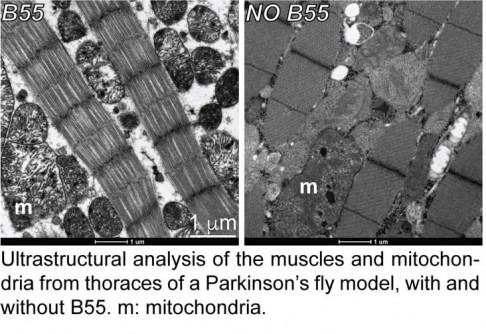Science
Researchers Uncover Key Switch for Cellular Health in Mitochondria

A significant breakthrough in cellular health has emerged from research conducted at the Università Cattolica in Rome. On October 3, 2025, scientists announced the discovery of a critical switch in cells that regulates mitochondrial function, opening pathways for potential therapies targeting various diseases, including Parkinson’s disease and rare mitochondrial disorders.
The switch, identified as phosphatase B55 (PP2A-B55alpha), plays a pivotal role in maintaining mitochondrial energy balance. Mitochondria are essential organelles responsible for producing energy necessary for cell survival. Disruptions in their function are linked to a range of health issues, from common conditions like Parkinson’s to less prevalent mitochondrial diseases affecting various body systems.
Understanding Mitochondrial Balance
Mitochondrial health is crucial for cellular integrity. The dynamic balance between the removal of damaged mitochondria and the generation of new ones is vital for maintaining cell function. In the context of Parkinson’s disease, a loss of mitochondria contributes to the degeneration of dopaminergic neurons, a hallmark of the condition.
The research led by Francesco Cecconi, a Full Professor of Biochemistry at the Università Cattolica, and Valentina Cianfanelli, an Associate Professor at Roma Tre University, highlights the critical role of B55 in regulating mitochondrial homeostasis. Professor Cecconi explained, “B55 not only promotes the degradation of damaged mitochondria by stimulating mitophagy but also stabilizes the mechanisms responsible for creating new mitochondria.”
This dual function ensures that cells can effectively manage their mitochondrial populations, preventing the accumulation of dysfunctional organelles that may compromise cell viability.
Implications for Future Therapies
The findings suggest that lowering the activity of B55 can alleviate motor symptoms associated with Parkinson’s in preclinical models. Specifically, the research demonstrated that reducing B55 levels improved both motor function and the mitochondrial dysfunction characteristic of the disease. This effect appears to depend on the presence of Parkin, a protein integral to the mitophagy process and linked to Parkinson’s pathology.
The implications of this discovery extend beyond Parkinson’s disease. The researchers propose that therapies targeting B55 could be developed to address various mitochondrial disorders, including certain mitochondrial myopathies and neurodegenerative diseases.
Moreover, the deregulation of mitochondrial quality and quantity has been implicated in cancer cell plasticity and their resistance to treatments. This raises the potential of B55 as a target in oncology, offering hope for innovative therapeutic strategies.
Professor Cecconi and his team plan to focus future studies on identifying safe molecules and therapeutic approaches to modulate B55, particularly in preclinical and human cellular models. They aim to explore the broader effects of B55 regulation on other neurodegenerative and mitochondrial diseases, emphasizing the necessity of developing targeted therapies that can penetrate the brain effectively.
In summary, the discovery of phosphatase B55 as a master regulator of mitochondrial degradation and biogenesis presents exciting opportunities for advancing treatment options for a range of diseases. The full study is available in Science Advances and is set to contribute to ongoing discussions about cellular health and disease management.
-

 Technology5 months ago
Technology5 months agoDiscover the Top 10 Calorie Counting Apps of 2025
-

 Health3 months ago
Health3 months agoBella Hadid Shares Health Update After Treatment for Lyme Disease
-

 Health3 months ago
Health3 months agoErin Bates Shares Recovery Update Following Sepsis Complications
-

 Technology4 months ago
Technology4 months agoDiscover How to Reverse Image Search Using ChatGPT Effortlessly
-

 Technology1 month ago
Technology1 month agoDiscover 2025’s Top GPUs for Exceptional 4K Gaming Performance
-

 Technology3 months ago
Technology3 months agoElectric Moto Influencer Surronster Arrested in Tijuana
-

 Technology5 months ago
Technology5 months agoMeta Initiates $60B AI Data Center Expansion, Starting in Ohio
-

 Technology5 months ago
Technology5 months agoRecovering a Suspended TikTok Account: A Step-by-Step Guide
-

 Health4 months ago
Health4 months agoTested: Rab Firewall Mountain Jacket Survives Harsh Conditions
-

 Lifestyle5 months ago
Lifestyle5 months agoBelton Family Reunites After Daughter Survives Hill Country Floods
-

 Health3 months ago
Health3 months agoAnalysts Project Stronger Growth for Apple’s iPhone 17 Lineup
-

 Technology4 months ago
Technology4 months agoHarmonic Launches AI Chatbot App to Transform Mathematical Reasoning



















